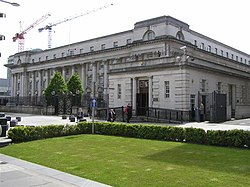| Logo of the Public Prosecution Service | |
 Royal Courts of Justice, Belfast | |
| Department overview | |
|---|---|
| Formed | June 13, 2005 |
| Preceding Department |
|
| Type | Non-ministerial government department |
| Jurisdiction | Northern Ireland |
| Headquarters | Belfast Chambers, 93 Chichester Street, Belfast, BT1 3JR 54°35′48″N5°55′19″W / 54.59664°N 5.92206°W |
| Motto | Independent, Fair, Effective |
| Employees | 399.2 FTE (2020-21) |
| Annual budget | £38.4 million (2020-21) |
| Department executives |
|
| Website | www |
The Public Prosecution Service for Northern Ireland (PPSNI) is the department of the Northern Ireland Executive responsible for public prosecutions of people charged with criminal offences in Northern Ireland. It is headed by the Director of Public Prosecutions for Northern Ireland. Its role is similar to that of the longer-established Crown Office and Procurator Fiscal Service in Scotland, and the Crown Prosecution Service in England and Wales. The PPSNI employs 50 Public Prosecutors and over 100 administrative staff. [1]
Contents
The Police Service of Northern Ireland investigate crimes. The PPSNI advise the police on possible prosecutions, authorise charge, review cases submitted by the police, prepare for and present cases in court.
It was established by the Justice (Northern Ireland) Act 2002. Prior to its establishment the police themselves would prosecute most offences, with some being referred to the former Department of the Director of Public Prosecutions.
The Director of Public Prosecutions for Northern Ireland is appointed by the Attorney General for Northern Ireland.